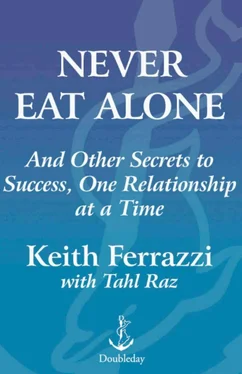Keith Ferrazzi - Never Eat Alone
Здесь есть возможность читать онлайн «Keith Ferrazzi - Never Eat Alone» весь текст электронной книги совершенно бесплатно (целиком полную версию без сокращений). В некоторых случаях можно слушать аудио, скачать через торрент в формате fb2 и присутствует краткое содержание. Год выпуска: 2005, ISBN: 2005, Издательство: C U R R E N C Y • D O U B L E D A Y, Жанр: marketing, на английском языке. Описание произведения, (предисловие) а так же отзывы посетителей доступны на портале библиотеки ЛибКат.
- Название:Never Eat Alone
- Автор:
- Издательство:C U R R E N C Y • D O U B L E D A Y
- Жанр:
- Год:2005
- ISBN:0-385-51529-4
- Рейтинг книги:4 / 5. Голосов: 1
-
Избранное:Добавить в избранное
- Отзывы:
-
Ваша оценка:
- 80
- 1
- 2
- 3
- 4
- 5
Never Eat Alone: краткое содержание, описание и аннотация
Предлагаем к чтению аннотацию, описание, краткое содержание или предисловие (зависит от того, что написал сам автор книги «Never Eat Alone»). Если вы не нашли необходимую информацию о книге — напишите в комментариях, мы постараемся отыскать её.
Never Eat Alone — читать онлайн бесплатно полную книгу (весь текст) целиком
Ниже представлен текст книги, разбитый по страницам. Система сохранения места последней прочитанной страницы, позволяет с удобством читать онлайн бесплатно книгу «Never Eat Alone», без необходимости каждый раз заново искать на чём Вы остановились. Поставьте закладку, и сможете в любой момент перейти на страницу, на которой закончили чтение.
Интервал:
Закладка:
Yes, there's a guide to getting the most out of a conference. My friend Paul Reddy, a software executive, claims people are either bowling balls or pins at a conference. If you're the ball, you walk (or roll) into a conference, event, or an organization, and you blow it apart. With a dash of bravado and ingenuity, you leave a positive impression in your wake, create friendships, and achieve the goals on your agenda. The pins sit placidly by, waiting for something, anything, to happen to them.
Don't think of your next conference as a business-related retreat. Think of it as a well-coordinated campaign to further your mission. Here are the rules I follow at each and every event I attend:
Help the Organizer (Better Yet, Be the Organizer)
Conferences are logistical nightmares. There are a thousand different things that go into pulling off a successful business gathering. The mess that can ensue is an opportunity for you to come in and help out—and become an insider in the process.
Once you're on the inside, you can find out who will be attending and what the hot events will be. And you'll find yourself at all those unlisted dinners and cocktail parties that are thrown for the conference poobahs.
How do you find yourself part of the process? It's not really all that hard. First, review the event's materials, visit its Web site, and find out who the main contact is for putting together the conference. Put in a phone call. The person responsible for these kinds of events is generally overworked and stressed out. I like to call these people a few months ahead of the event and say, "I'm really looking forward to the conference you're putting together. I'm interested in helping make this year be the best year ever, and I'm willing to devote a chunk of my resources—be it time, creativity, or connections—to make this year's event a smash hit. How can I help?"
I guarantee the coordinator will be shocked with delight. I say that because I was once responsible for those stressed-out planners back in my early days as CMO of Deloitte.
Deloitte Consulting was working with Michael Hammer to grow a credible reengineering practice. We thought a conference might be a great way to introduce our relationship with Michael to the market, strengthen our brand, and win a few customers to boot. So we proposed a joint conference hosted by Deloitte and Michael Hammer. We would bring the industry expertise and case studies, and Michael would bring his expertise in reengineering and his understanding of how to run a world-class conference.
It gave me a chance to see the inner workings of how a successful conference is orchestrated and of course build a great relationship with Mike. I became acutely aware of how powerful it was to know, in advance, who would be attending; why some speakers were chosen and some were not; and what the best forums were for networking.
From the outset, our idea was to apply some method to the usual conference madness. A tracking system was put in place that recorded daily our progress against the objectives we set for ourselves. Each Deloitte partner's objective was to meet two people who were assigned to them from the guests we knew would be attending. Each was given one person as a primary target—someone we really wanted to win as a client. The other person was someone we thought Deloitte would benefit from knowing, perhaps a member of the media. The basic goal remained, quite simply, to meet new people.
Because we knew who was attending beforehand, the partners got a one-page bio on the people assigned them, listing who they were, what they did, their accomplishments and hobbies, and the potential challenges their company faced that Deloitte might be able to address. This was enough information to make a real connection when the partner finally met the individual.
We also gave the partners a list of ideas of how to actually catch up with their targets and what to say when they met them. At the end of each day, the partners would report whom they met, where, and how the encounter went. If someone had a difficult time meeting their target person, we strategized for the next day, making sure that the partner and the individual they were assigned to would sit at the same dinner table the following evening, or I'd make a point of making the introduction myself, or we'd ask Mike to make an intro in a few cases.
What I had unknowingly created was a unit of conference commandos, prepared in advance with information on who they were to meet, how (we had done research), and where. The results were astounding. The conference was packed. As a result, Deloitte saw an unprecedented amount of business come its way. We have since perfected this art at FerrazziGreenlight, and not only do we advise companies on how to get the most out of their conferences, but also big conference-givers like Forbes and PeopleSoft come to us to help them design conferences that will have world-class outcomes for both these companies and their conference attendees.
The key is to work hard to make the conference a success for everyone. At the Hammer conference, all attendees, almost across the board, were shocked by how much business they got done. The right environment was set for networking success.
Of course, Michael Hammer was brilliant, as always, and there was much for all of us to learn from him on content. But everyone's success came from organizing a conference around its real function: an intimate gathering of like-minded professionals in an atmosphere that facilitates profitable relationships.
Listen. Better Yet, Speak
Are you someone who thinks becoming a speaker is a big deal? That's true for a lot of people. I'm here to tell you it's not as tough as you might think, but it is also perhaps more important than you can imagine
Nothing frightens the daylights out of some people like the thought of spending fifteen minutes talking about what they do in front of an audience, even if the audience is made up of generally receptive folks (like family and friends!).
Calm yourself. First, you should know that giving speeches is one of the easiest and most effective ways to get yourself, your business, and your ideas seen, heard of, and remembered, and you don't need to be Tony Robbins to find yourself a forum of people willing to hear you out.
How many people find themselves in front of an audience on any given day? The numbers are shocking. There are thousands of forums and events going on—for every imaginable reason—each and every day. All these forums need a warm body to say something the slightest bit inspiring or insightful to their guests. Most speakers, unfortunately, deliver neither.
If you think the people delivering this insight are only those at the top of their respective fields, you're mistaken. So how do you get experience?
Toastmasters International, for instance, provides a forum for the development of speaking skills. With more than 8,000 clubs meeting weekly in groups of up to thirty or forty people, there are a whole lot of speeches, and speakers, being made. On a larger scale, the national speaker circuit is huge. The American Society of Association Executives (ASAE) says the meetings industry is a nearly $83 billion market, with over $56 billion being spent annually on conventions and seminars alone. That ranks conferences— get this!—as the twenty-third-largest contributor to the Gross National Product. The point here is that the opportunity to speak exists everywhere, paid or unpaid. It's fun, it can be profitable, and there's no better way to get yourself known—and get to know others—at an event. Study after study shows that the more speeches one gives, the higher one's income bracket tends to be.
As a speaker at a conference, you have a special status, making meeting people much easier. Attendees expect you to reach out and greet them. They, in turn, give you respect that they don't accord their fellow attendees. Instant credibility and faux-fame is bestowed upon you when you're on a stage (and pretty much any stage, at that).
Читать дальшеИнтервал:
Закладка:
Похожие книги на «Never Eat Alone»
Представляем Вашему вниманию похожие книги на «Never Eat Alone» списком для выбора. Мы отобрали схожую по названию и смыслу литературу в надежде предоставить читателям больше вариантов отыскать новые, интересные, ещё непрочитанные произведения.
Обсуждение, отзывы о книге «Never Eat Alone» и просто собственные мнения читателей. Оставьте ваши комментарии, напишите, что Вы думаете о произведении, его смысле или главных героях. Укажите что конкретно понравилось, а что нет, и почему Вы так считаете.












